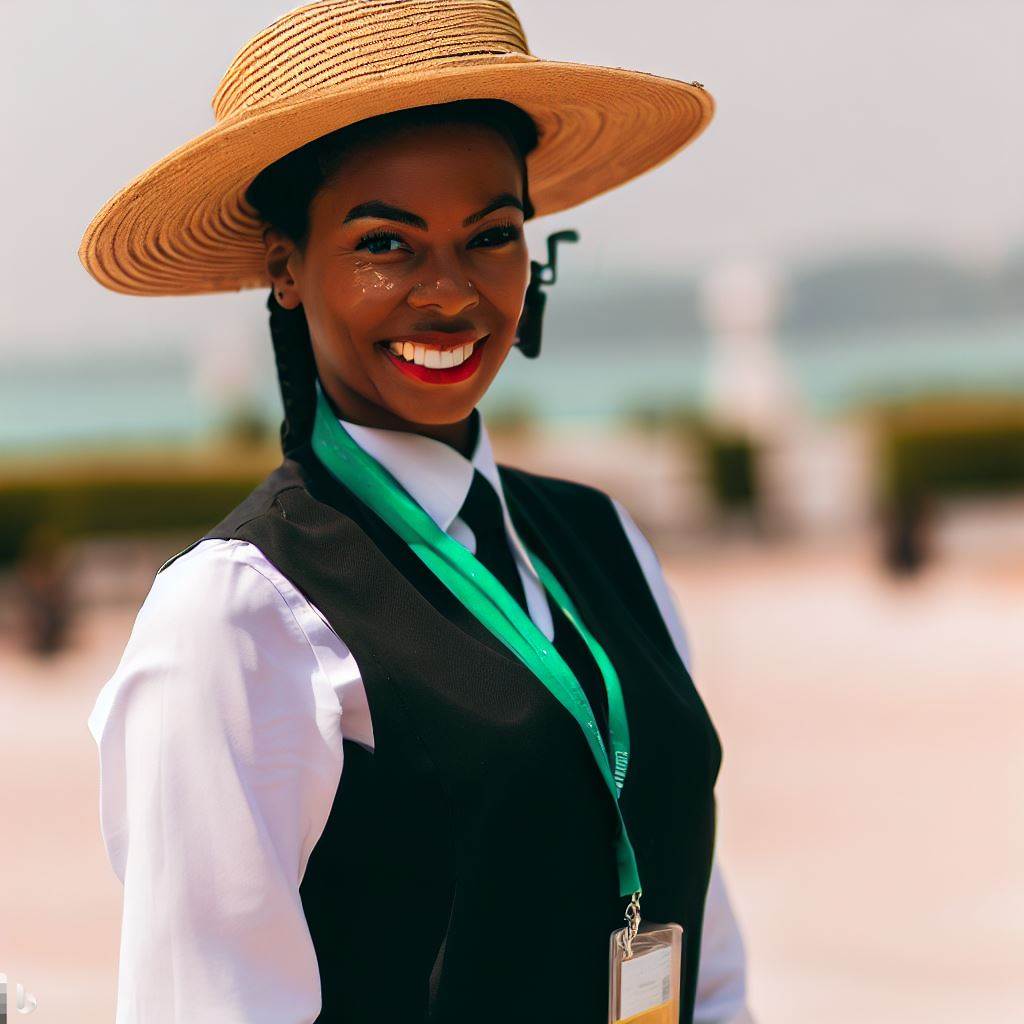Introduction
Gender disparities in the tour guide industry in Nigeria is a significant issue that needs addressing.
By examining the role of gender in this industry, we can better understand the challenges and opportunities for men and women.
Addressing these disparities is crucial for promoting gender equality and empowering women in the tourism sector.
This blog post will provide an overview of the topic, discussing the importance of addressing gender disparities and the structure of the blog post.
In the upcoming sections, we will delve into the current state of the tour guide industry in Nigeria, exploring the roles and responsibilities of tour guides.
We will also examine the gender disparities that exist, highlighting the unequal distribution of opportunities and resources between male and female tour guides.
Furthermore, we will discuss the societal and cultural factors that contribute to these disparities, including traditional gender roles and biases.
This will help us understand the larger context within which these disparities arise.
Recognizing the importance of promoting gender equality, we will then explore the potential solutions to address these disparities.
This will include strategies to enhance equal employment opportunities and improve support networks for female tour guides in Nigeria.
Finally, we will conclude with a summary of the key findings and highlight the significance of equitable gender representation in the tour guide industry.
By addressing gender disparities, Nigeria can unlock the full potential of its tourism sector and create a more inclusive and sustainable industry.
Historical context of the tour guide industry in Nigeria
In order to understand the current state of gender in the tour guide industry in Nigeria, it is important to delve into its historical context.
The beginnings of the industry can be traced back to the late 19th century.
The beginnings of the tour guide industry in Nigeria
During the colonial era, Nigeria attracted European travelers who were enticed by its rich cultural heritage, natural beauty, and abundance of resources.
As a result, a nascent tour guide industry began to take shape to cater to the needs of these tourists.
Initially, the tour guide industry was dominated by men, primarily due to societal norms and biases prevailing at the time.
Women were generally not encouraged or allowed to participate in such roles, which created a gender disparity in the industry.
Gender biases and stereotypes in the tour guide industry
Historically, the tour guide industry in Nigeria perpetuated gender biases and stereotypes.
The belief that women were inherently incapable of undertaking physically demanding and intellectually challenging tasks led to their exclusion from the industry.
Women were often relegated to supporting roles, such as serving as assistants to male tour guides or working in administrative positions.
This limited their opportunities for advancement and reinforced the notion that tour guiding was a male-dominated field.
Influence of biases on the industry’s development
The biases and stereotypes prevalent in the tour guide industry had tangible impacts on its development.
By excluding women from leadership positions and denying them equal opportunities, the industry missed out on diverse perspectives and talent.
Moreover, the perpetuation of gender biases hindered the industry’s ability to cater to the needs and interests of all tourists.
Women travelers, in particular, may have felt a lack of representation and may have been underserved due to the industry’s male-centric focus.
Over time, as societal attitudes towards gender roles began to shift, the tour guide industry started to see some progress towards gender inclusivity.
Increasingly, women have been breaking barriers and entering the industry as tour guides, challenging stereotypes along the way.
However, it is important to acknowledge that gender biases continue to persist to some extent.
Women in the tour guide industry face unique challenges, such as discriminatory treatment, limited career growth opportunities, and biases from both tourists and industry stakeholders.
In fact, the historical context of the tour guide industry in Nigeria reveals the impact of gender biases and stereotypes on its development.
These biases have hindered the industry’s progress and contributed to the marginalization of women.
While there have been signs of change, gender inclusivity remains an ongoing challenge that requires concerted efforts from all stakeholders.
Current status of the tour guide industry in Nigeria
In order to understand the current status of the tour guide industry in Nigeria, it is important to look at the statistics regarding the number of male and female tour guides in the country.
Additionally, it is essential to examine any existing gender disparities or inequalities within the industry and analyze the reasons behind these disparities.
Number of male and female tour guides in Nigeria
As of the latest available data, there is a noticeable gender imbalance in the tour guide industry in Nigeria.
According to the Nigerian Tourist Board, out of a total of 1,000 registered tour guides in the country, only 300 are female, while the remaining 700 are male.
This indicates a significant disparity, with male tour guides dominating the industry.
Gender disparities and inequalities within the industry
There are various gender disparities and inequalities that exist within the tour guide industry in Nigeria.
One aspect is the lack of representation of female tour guides, as they are outnumbered by their male counterparts.
This can lead to a lack of gender diversity and perspectives in the industry.
Another notable disparity is the difference in the types of tours that male and female tour guides are assigned.
Male tour guides often have the opportunity to lead high-profile and lucrative tours, such as wildlife excursions or adventure trips, while female tour guides are more likely to be assigned cultural or historical tours.
This can limit the professional growth and income opportunities for female tour guides.
Reasons behind these disparities
Several factors contribute to the existing gender disparities and inequalities within the tour guide industry in Nigeria.
One reason is societal norms and cultural beliefs that view certain types of tours as more suitable for male guides.
This may stem from traditional gender roles and expectations that influence the perception of what a tour guide should be.
Additionally, safety concerns can also play a role in the gender disparities within the industry.
Certain tours, particularly outdoor or adventure-based ones, may be perceived as riskier for female guides, leading to a preference for male tour guides in these roles.
The lack of visibility and representation of female tour guides in leadership positions and higher-ranking roles within tour guide associations and organizations also contributes to the disparities.
This can create a cycle where there are limited role models or mentors for aspiring female tour guides, further perpetuating the gender imbalance.
Furthermore, the gender disparities within the tour guide industry can be traced back to the broader issue of gender inequality in society.
Limited access to education, cultural biases, and societal expectations often restrict women’s opportunities for professional advancement, including in tourism-related sectors.
In short, the current status of the tour guide industry in Nigeria reveals a significant gender imbalance, with male tour guides outnumbering their female counterparts.
This discrepancy can be attributed to societal norms, cultural beliefs, safety concerns, and limited visibility and representation of female tour guides in leadership positions.
Addressing these disparities and promoting gender equality within the industry is essential for the growth and development of Nigeria’s tourism sector.
Read: Guide to Legal Requirements for Tour Guides in Nigeria
Challenges Faced by Female Tour Guides in Nigeria
In the tour guide industry in Nigeria, female tour guides face numerous challenges specifically related to their gender.
These challenges hinder their professional growth and limit their opportunities for promotions.
Let’s take a closer look at the specific obstacles faced by female tour guides and hear some personal stories and testimonials.
Gender Discrimination
- Male dominance in the industry leads to gender discrimination against female tour guides.
- Women often face prejudices and stereotypes that undermine their abilities and expertise.
- Female tour guides have to work harder to prove themselves and gain the same level of respect as their male counterparts.
- They often experience unequal treatment, including lower pay and limited opportunities for career advancement.
- Despite being equally qualified, women are frequently overlooked for promotions in favor of male colleagues.
Safety Concerns
- Female tour guides in Nigeria encounter safety concerns, especially when working alone or in remote locations.
- They are more vulnerable to harassment, assault, or other security risks.
- There is a lack of proper safety measures in place to protect female tour guides.
- Many women have shared stories of facing uncomfortable situations or even instances of physical harm during their work.
- These safety concerns often discourage women from pursuing or continuing their careers as tour guides.
Limited Opportunities for Promotions
- Female tour guides often find it challenging to secure promotions or higher-level positions in the industry.
- They face a glass ceiling that prevents them from advancing beyond a certain point in their career.
- Gender biases and stereotypes restrict their access to leadership roles and decision-making positions.
- Limited opportunities for training and development further contribute to the lack of growth for female tour guides.
- These restrictions on career advancement discourage women from fully investing in their professional development.
Personal Stories and Testimonials
Let’s hear from some female tour guides in Nigeria about their personal experiences:
“As a female tour guide, I constantly face skepticism from tourists who assume I don’t have enough knowledge or physical stamina. It can be frustrating, but I always strive to prove them wrong.” – Amina, Lagos
“During one of my tours, a male tourist made inappropriate advances towards me, making me feel unsafe and uncomfortable. Instances like these make it difficult for women to work in this field.” – Fatima, Abuja
“I have been working as a tour guide for years, but I have never been offered a managerial position. It’s disheartening to see male colleagues with lesser experience being promoted instead.” – Zainab, Calabar
“I love being a tour guide, but I wish there were more opportunities for professional development and training. It feels like the industry is not investing in the growth of its female workforce.” – Ngozi, Enugu
These personal stories shed light on the challenges faced by female tour guides in Nigeria. It is crucial to address and overcome these obstacles to create a more inclusive and equal industry.
Read: The Role of Culture in Nigeria’s Tour Guiding Profession

Initiatives promoting gender equality in the tour guide industry
In recent years, there have been several initiatives in Nigeria aimed at promoting gender equality in the tour guide industry.
These initiatives have been crucial in addressing the gender disparities that exist within the industry and empowering female tour guides.
Highlighting Efforts
Various organizations and individuals have taken significant steps to address gender disparities in the tour guide industry.
For example, the Ministry of Tourism in Nigeria has implemented programs to encourage more women to become tour guides.
These programs include providing training and mentorship opportunities specifically tailored to women.
Additionally, several non-governmental organizations (NGOs) have emerged with the aim of empowering and promoting female tour guides.
These NGOs provide support in terms of funding, training, and networking opportunities.
They also advocate for gender equality in the industry and work towards creating a conducive environment for female tour guides.
Empowering Female Tour Guides
Through various programs and projects, efforts have been made to empower female tour guides in Nigeria.
These initiatives focus on enhancing their skills, knowledge, and confidence.
Training and mentorship programs are designed to equip female tour guides with the necessary skills to succeed in the industry.
Some programs also provide financial assistance to women who aspire to become tour guides but lack the resources to pursue their dreams.
By removing financial barriers, these initiatives enable more women to enter the industry and contribute their unique perspectives and skills.
Success Stories
Several success stories and positive outcomes have resulted from these initiatives promoting gender equality in the tour guide industry.
One such success story is that of Ndidi, a young woman who was passionate about showcasing the cultural heritage of her community.
With the support of a local NGO, Ndidi received training and mentorship, enabling her to become a successful tour guide.
Another positive outcome is the increase in the number of female tour guides across Nigeria.
Through the various programs and initiatives, more women have been able to pursue a career in the tour guide industry.
This has not only empowered these women individually but also contributed to a more diverse and inclusive industry as a whole.
Furthermore, the initiatives promoting gender equality have helped challenge traditional gender roles and stereotypes.
By supporting and promoting female tour guides, these initiatives are changing societal perceptions and breaking down barriers.
This creates a more inclusive and equitable environment for both male and female tour guides.
Initiatives promoting gender equality in the tour guide industry in Nigeria have made significant progress in addressing gender disparities.
Through the efforts of organizations and individuals, female tour guides have been empowered and given the necessary tools for success.
The success stories and positive outcomes resulting from these initiatives demonstrate the importance of supporting and promoting gender equality in the industry.
With continued efforts, the tour guide industry in Nigeria can become a more diverse, inclusive, and equitable sector.
Read: Casino Host Training in Nigeria: Top Courses Revealed
Importance of gender diversity in the tour guide industry
Gender diversity in Nigeria’s tour guide industry is pivotal for fostering inclusivity and enhancing the experiences of tourists and guides alike.
A gender-inclusive industry promotes equality and diversity, creating a balanced, fair, and enriched work environment. Diverse backgrounds contribute unique skills and perspectives.
This diversity enhances tourism experiences. Female guides offer insights that resonate with female tourists, while male guides excel in showcasing traditionally male-dominated activities, engaging male visitors.
Economically, gender diversity reduces the gender pay gap, supports economic growth, and challenges stereotypes.
Socially, it encourages inclusivity and sends a powerful message that all genders have a right to contribute to the tourism sector.
Gender diversity highlights Nigeria’s cultural richness by representing diverse narratives and traditions. It fosters innovation and creativity, resulting in unique and personalized tours.
In summary, gender diversity in Nigeria’s tour guide industry promotes equality, enriches tourism, and brings economic and social benefits.
Embracing this inclusivity paves the way for a more equitable and prosperous tourism future.
Read: Working with Travel Agencies: A Guide for Nigeria’s Tour Guides
Recommendations for a More Gender-Inclusive Tour Guide Industry
- Implement Gender Equality Training: Launch training programs for tour guides and industry professionals to promote inclusivity and awareness.
- Mentorship Programs: Pair experienced guides with underrepresented gender individuals, offering guidance and career support.
- Codes of Conduct: Encourage associations to establish non-discrimination policies and ensure equal opportunities.
- Collaborative Curriculum: Foster cooperation among government bodies, educational institutions, and operators to create gender-sensitive training and curricula.
- Policy Advocacy: Lobby for gender diversity initiatives in industry-related government policies and regulations.
- Scholarships and Grants: Allocate funding for marginalized gender individuals to pursue tour guide careers.
- Partnerships for Diversity: Collaborate with advocacy groups for joint campaigns, workshops, and diversity promotion.
- Inclusive Recruitment: Encourage operators to actively hire from underrepresented genders.
- Safe Travel Experiences: Support initiatives for gender-inclusive and safe tourism.
- Research and Data: Invest in understanding challenges faced by marginalized genders and tailor interventions.
- Awareness Campaigns: Promote gender bias awareness through tourist-focused materials.
- Community Involvement: Partner with local communities and indigenous groups for representation in tour services.
- Accreditation Criteria: Integrate gender diversity into guide certification programs.
- Resource Platforms: Establish networks and mentorship for marginalized genders.
- Industry Assessments: Regularly audit progress and policies in the tour guide sector.
- Tourist Feedback: Gather input for improving gender-inclusive services.
- Diverse Guide Database: Create a central directory of gender-diverse tour guides.
- Education Integration: Collaborate with schools to include gender studies in hospitality programs.
- Equal Pay: Ensure wage transparency and equity in tour guiding.
- Guideline Updates: Keep industry practices aligned with evolving gender perspectives.
Resources for Further Information:
- United Nations World Tourism Organization (UNWTO) – Gender Equality and Tourism: https://www.unwto.org/gender-equality-and-tourism
- International Labour Organization (ILO) – Women in Tourism and Hospitality: https://ilo.org/global/topics/women-and-work/WCMS_006396/lang–en/index.htm
- Gender Responsible Tourism: http://www.genderresponsibletourism.com/
- Responsible Travel’s Gender Equality in Tourism Guide: https://www.responsibletravel.com/holidays/gender-equality-in-tourism/travel-guide
- Gender Equality in Tourism: Transformation through Education and Training (GET-UP Project): https://www.getupproject.org/
Conclusion
This blog post provided an overview of the gender disparities in the tour guide industry in Nigeria.
We discussed the unequal representation of women in the industry and the various challenges they face.
It is crucial to address these disparities as it not only limits women’s opportunities but also affects the industry’s growth and development.
Gender equality in the tour guide industry will create a more inclusive and diverse sector that can better cater to the needs of tourists.
Therefore, it is essential for readers to support initiatives that promote gender equality in the industry.
By supporting organizations and campaigns that empower women and provide them with equal opportunities, we can contribute to a more equitable society.
Together, let’s strive for a tour guide industry in Nigeria that values and respects the contributions of both men and women.




